John Krebs, Baron Krebs (born 1945) is an English zoologist. John Krebs could also refer to:
- John Hans Krebs (1926-2014), Israeli-American politician and attorney
- John Krebs (racing driver) (1950-2023), American professional stock car racer
John Krebs, Baron Krebs (born 1945) is an English zoologist. John Krebs could also refer to:

Krebs is a city in Pittsburg County, Oklahoma, United States. The population was 2,053 at the 2010 census, a slight increase from 2,051 in 2000. Its nickname is "Little Italy." Krebs was founded before Oklahoma statehood as a coal-mining town in the Choctaw Nation of Indian Territory.
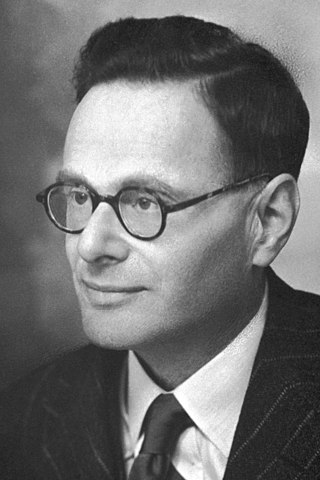
Sir Hans Adolf Krebs, FRS was a German-born British biologist, physician and biochemist. He was a pioneer scientist in the study of cellular respiration, a biochemical process in living cells that extracts energy from food and oxygen and makes it available to drive the processes of life. He is best known for his discoveries of two important sequences of chemical reactions that take place in the cells of nearly all organisms, including humans, other than anaerobic microorganisms, namely the citric acid cycle and the urea cycle. The former, often eponymously known as the "Krebs cycle", is the sequence of metabolic reactions that allows cells of oxygen-respiring organisms to obtain far more ATP from the food they consume than anaerobic processes such as glycolysis can supply; and its discovery earned Krebs a Nobel Prize in Physiology or Medicine in 1953. With Hans Kornberg, he also discovered the glyoxylate cycle, a slight variation of the citric acid cycle found in plants, bacteria, protists, and fungi.
Krebs is the German and Danish word for "crab" and "cancer". It may refer to:
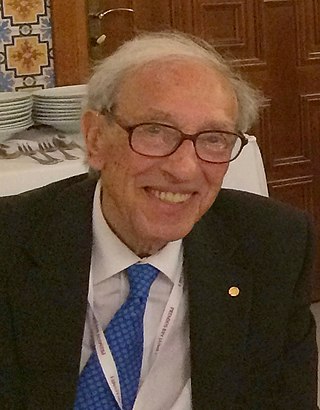
Edmond Henri Fischer was a Swiss-American biochemist. He and his collaborator Edwin G. Krebs were awarded the Nobel Prize in Physiology or Medicine in 1992 for describing how reversible phosphorylation works as a switch to activate proteins and regulate various cellular processes. From 2007 until 2014, he was the Honorary President of the World Cultural Council. At the time of his death at age 101 in 2021, he was the oldest living Nobel Prize laureate.
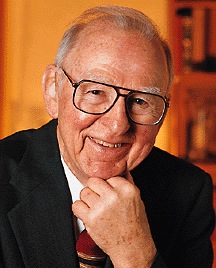
Edwin Gerhard Krebs was an American biochemist. He received the Albert Lasker Award for Basic Medical Research and the Louisa Gross Horwitz Prize of Columbia University in 1989 together with Alfred Gilman and, together with his collaborator Edmond H. Fischer, was awarded the Nobel Prize in Physiology or Medicine in 1992 for describing how reversible phosphorylation works as a switch to activate proteins and regulate various cellular processes.

"Soldier's Home" is a short story by Ernest Hemingway. It was included in the 1925 Contact Collection of Contemporary Writers and published by Boni & Liveright in Hemingway's 1925 New York collection short stories, In Our Time.

Harvey Thomas Dunn NA, also known as J. Harvey Dunn, was an American painter and teacher. During World War I, Dunn was an artist-correspondent with the American Expeditionary Forces in Europe. Most of Dunn's war sketches are housed at the Smithsonian Institution in the National Museum of American History in Washington, D.C. He is best known for his prairie-intimate masterpiece, The Prairie is My Garden (1950). In this painting, a mother and her two children are out gathering flowers from the quintessential prairie of the Great Plains.
Brian Krebs is an American journalist and investigative reporter. He is best known for his coverage of profit-seeking cybercriminals. Krebs is the author of a daily blog, KrebsOnSecurity.com, covering computer security and cybercrime. From 1995 to 2009, Krebs was a reporter for The Washington Post and covered tech policy, privacy and computer security as well as authoring the Security Fix blog.
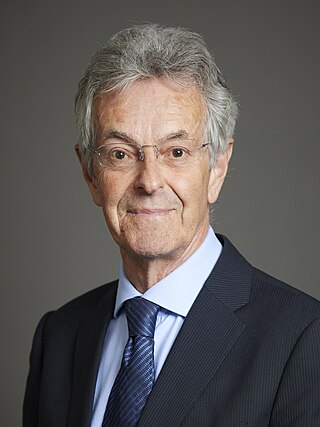
John Richard Krebs, Baron Krebs, FRS is an English zoologist researching in the field of behavioural ecology of birds. He was the principal of Jesus College, Oxford, from 2005 until 2015. Lord Krebs was President of the British Science Association from 2012 to 2013.
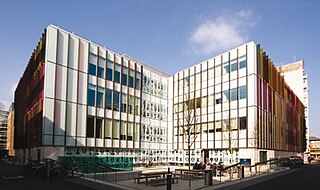
The Department of Biochemistry of Oxford University is located in the Science Area in Oxford, England. It is one of the largest biochemistry departments in Europe. The Biochemistry Department is part of the University of Oxford's Medical Sciences Division, the largest of the university's four academic divisions, which has been ranked first in the world for biomedicine.

John Hans Krebs was an Israeli-American politician and attorney who served as a U.S. Representative for California's 17th congressional district from 1975 to 1979.

This comparison of orbital launch systems lists the attributes of all individual rocket configurations designed to reach orbit. A first list contains rockets that are operational or in development as of 2022; a second list includes all retired rockets. For the simple list of all conventional launcher families, see: Comparison of orbital launchers families. For the list of predominantly solid-fueled orbital launch systems, see: Comparison of solid-fueled orbital launch systems.
Hans Krebs is the name of:

Hans Krebs was a German Army general of infantry who served during World War II. A career soldier, he served in the Reichswehr and the Wehrmacht. He served as the last Chief of Staff of the Oberkommando des Heeres (OKH) during the final phase of the war in Europe. Krebs tried to open surrender negotiations with the Red Army; he committed suicide in the Führerbunker during the early hours of 2 May 1945, two days after Adolf Hitler killed himself.

The Miami Line is an urban-scale multicolored neon-light installation, designed by Rockne Krebs, in the U.S. city of Miami, Florida, stretching 1,540 feet (470 m) along the Metrorail bridge over the Miami River. When Krebs created the first phase of The Miami Line in 1984, it was 300 feet (91 m) long. Because of to its great popularity, the piece was greatly expanded in 1988 to a total of 1,540 feet (470 m).
Mirai is a malware that turns networked devices running Linux into remotely controlled bots that can be used as part of a botnet in large-scale network attacks. It primarily targets online consumer devices such as IP cameras and home routers. The Mirai botnet was first found in August 2016 by MalwareMustDie, a white hat malware research group, and has been used in some of the largest and most disruptive distributed denial of service (DDoS) attacks, including an attack on 20 September 2016 on computer security journalist Brian Krebs' website, an attack on French web host OVH, and the October 2016 Dyn cyberattack. According to a chat log between Anna-senpai and Robert Coelho, Mirai was named after the 2011 TV anime series Mirai Nikki.

The Clydesdale Motor Truck Company was a motor company that existed from 1917 to 1939 with headquarters in Clyde, Ohio. Initially, they made military trucks for World War I. Military contracts continued to be a large part of their business after the war, but they also sold into many other markets: general haulage, farming, and specialized vehicles such as fire trucks. They survived the Wall Street Crash of 1929 and the Great Depression, but increasingly struggling, they were wound up in 1939.
John Krebs was an American professional stock car racing driver. Hailing from Roseville, California, he was a 15-year veteran of NASCAR's Cup Series, competing in 19 events from 1978 to 1994. He also competed in the Winston West Series for many years, scoring one win in the series in 1978.
Ernst Krebs may refer to:

The Department of Biology, established in 2022, is a science department in the University of Oxford's Mathematical, Physical and Life Sciences Division. It was formed on 1 August 2022 after a merger between the Department of Plant Sciences and Department of Zoology.